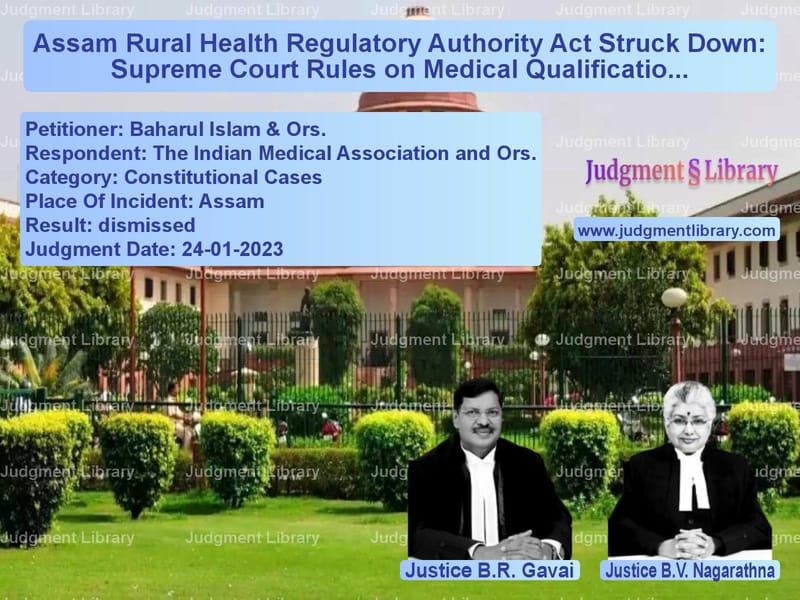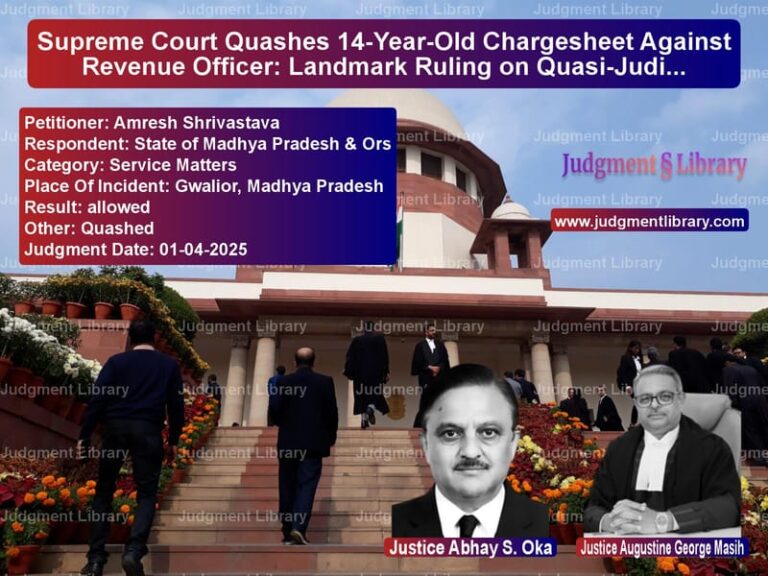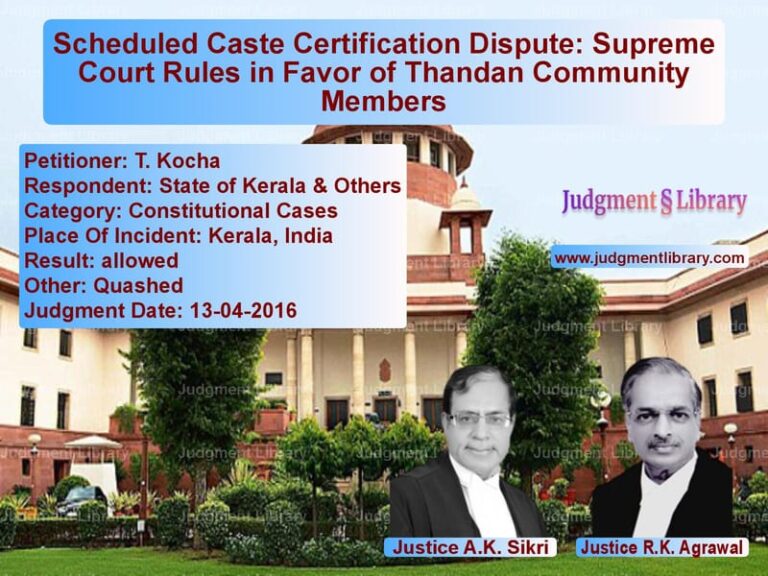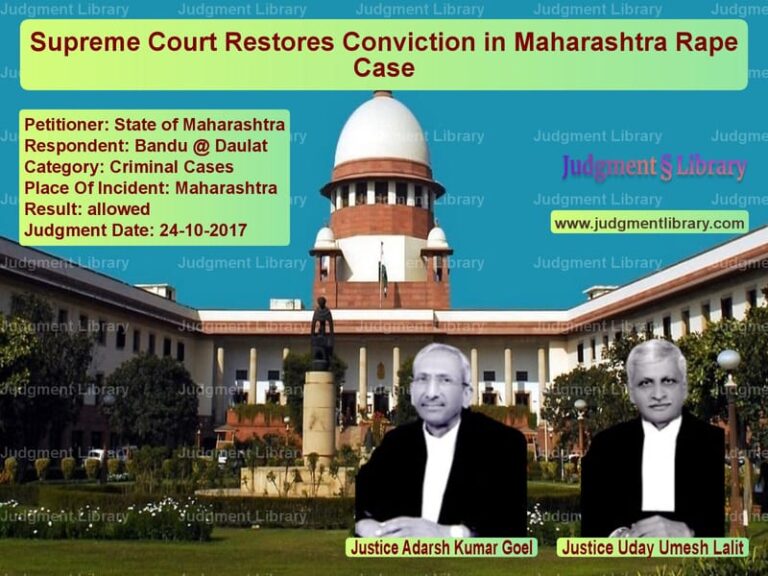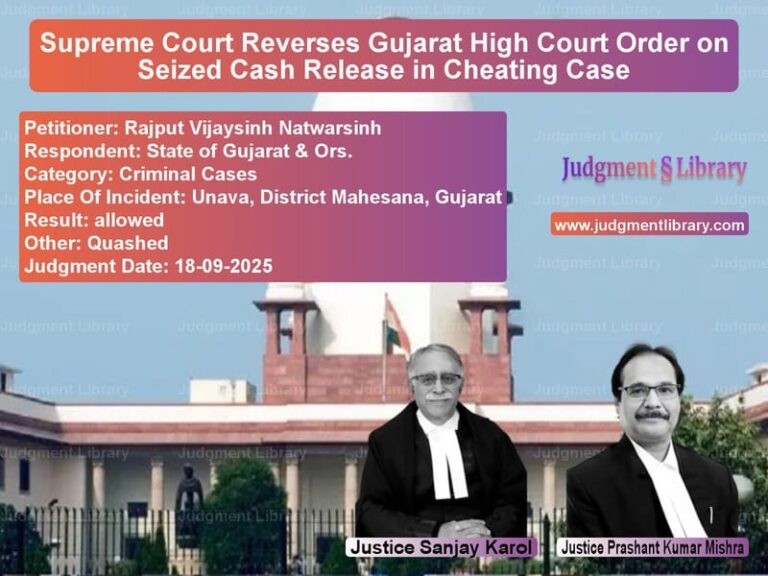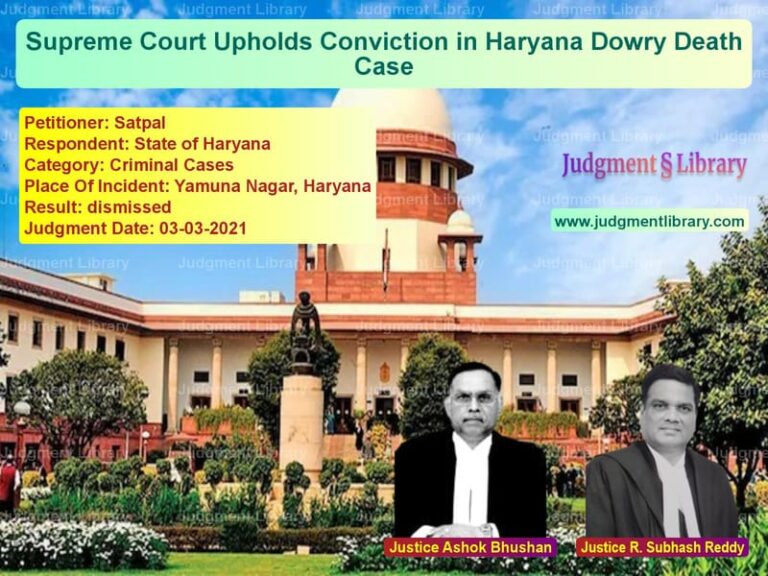Assam Rural Health Regulatory Authority Act Struck Down: Supreme Court Rules on Medical Qualification Standards
The case of Baharul Islam & Ors. v. The Indian Medical Association & Ors. is a landmark ruling concerning the validity of the Assam Rural Health Regulatory Authority Act, 2004. The Supreme Court examined whether the Act, which allowed diploma holders in medicine and rural healthcare to practice in rural areas, was in conflict with the Indian Medical Council Act, 1956, which exclusively governs medical education and practice in India.
Background of the Case
The Assam Legislature enacted the Assam Rural Health Regulatory Authority Act, 2004 (“Assam Act”) to establish a regulatory body for granting registration to diploma holders in Medicine and Rural Health Care (DMRHC). The Act allowed these diploma holders to provide basic medical care in rural areas where access to full-fledged medical professionals was limited. The State Government justified this legislation as a means to address the shortage of doctors in rural Assam.
The Indian Medical Association (IMA) challenged the Assam Act in the Gauhati High Court, arguing that it violated the Indian Medical Council Act, 1956 (“IMC Act”), which exclusively regulates the medical profession in India. The High Court ruled in favor of the IMA, striking down the Assam Act as unconstitutional and beyond the competence of the State Legislature. The diploma holders, who had been granted licenses under the Assam Act, challenged this ruling in the Supreme Court.
Legal Issues Considered
The Supreme Court examined the following key legal questions:
- Whether the Assam Act was in conflict with the Indian Medical Council Act, 1956.
- Whether the State Legislature had the competence to enact the Assam Act under the Constitution.
- Whether diploma holders in Medicine and Rural Health Care could be legally permitted to practice medicine in rural areas.
- Whether the Assam Act violated the fundamental right to health by allowing underqualified practitioners to provide medical treatment.
Arguments by the Petitioners (Baharul Islam & Ors.)
The petitioners, who were diploma holders registered under the Assam Act, contended that:
- The Assam Act was enacted to address the acute shortage of medical professionals in rural areas, ensuring that people in remote locations received basic healthcare.
- The Indian Medical Council Act did not expressly prohibit the State from enacting a law regulating rural healthcare providers.
- The diploma holders were trained to provide primary healthcare services, and their work did not infringe upon the domain of professional medical practitioners governed by the IMC Act.
- The High Court erred in striking down the Assam Act without considering the severe healthcare crisis in rural Assam.
Arguments by the Respondents (Indian Medical Association & Ors.)
The Indian Medical Association, representing qualified medical professionals, countered these claims, arguing that:
- The IMC Act is a central legislation that regulates medical education and professional practice in India. Any State law conflicting with the IMC Act is void under Article 254 of the Constitution.
- The Assam Act attempted to create an alternative medical qualification without the approval of the Medical Council of India, leading to substandard healthcare practices.
- The practice of medicine requires rigorous training and expertise, which diploma holders under the Assam Act lacked, thereby endangering public health.
- The Supreme Court had previously ruled that medical education and professional regulation fall within the purview of the Central Government, making the Assam Act unconstitutional.
Supreme Court’s Judgment
The Supreme Court ruled as follows:
- The Assam Act was unconstitutional: The Court held that the Assam Legislature lacked the competence to pass a law regulating medical qualifications, which falls under the exclusive domain of the IMC Act.
- Medical education is governed by central law: The Court reaffirmed that only the Medical Council of India has the authority to recognize medical qualifications.
- The diploma holders could not be recognized as medical practitioners: The Court ruled that individuals trained under the Assam Act could not be legally permitted to practice medicine.
- Fundamental right to health must be protected: The Court noted that allowing underqualified practitioners to provide medical care could compromise patient safety.
- The High Court’s decision was upheld: The Supreme Court dismissed the appeal and affirmed the unconstitutionality of the Assam Act.
Analysis of the Judgment
The ruling reinforces the principle that medical education and professional practice must be regulated by national standards to ensure uniformity and public safety.
Implications for Medical Education
- Only medical qualifications recognized by the Medical Council of India will be valid.
- States cannot create parallel medical licensing systems.
- Standardization of medical education across India will be maintained.
Implications for Healthcare in Rural Areas
- The ruling highlights the urgent need for the Central Government to address healthcare shortages in rural India.
- Alternative solutions such as community health worker programs and telemedicine initiatives may need to be considered.
- State Governments must seek approval from the Medical Council of India before introducing new medical training programs.
Implications for Future State Legislation
- State Governments must ensure that new laws regulating professions do not conflict with Central laws.
- Legislative measures must adhere to constitutional provisions on legislative competence.
- Judicial scrutiny will continue to play a key role in determining the validity of State laws affecting regulated professions.
Conclusion
The Supreme Court’s judgment in this case ensures that medical education and practice remain standardized across India, protecting public health from substandard healthcare services. By striking down the Assam Act, the Court has reaffirmed the supremacy of the Indian Medical Council Act in regulating medical qualifications, setting a precedent for future cases concerning professional regulation at the State level.
Petitioner Name: Baharul Islam & Ors..Respondent Name: The Indian Medical Association and Ors..Judgment By: Justice B.R. Gavai, Justice B.V. Nagarathna.Place Of Incident: Assam.Judgment Date: 24-01-2023.
Don’t miss out on the full details! Download the complete judgment in PDF format below and gain valuable insights instantly!
Download Judgment: baharul-islam-&-ors.-vs-the-indian-medical-a-supreme-court-of-india-judgment-dated-24-01-2023.pdf
Directly Download Judgment: Directly download this Judgment
See all petitions in Fundamental Rights
See all petitions in Constitution Interpretation
See all petitions in Legislative Powers
See all petitions in Public Interest Litigation
See all petitions in Judgment by B R Gavai
See all petitions in Judgment by B.V. Nagarathna
See all petitions in dismissed
See all petitions in supreme court of India judgments January 2023
See all petitions in 2023 judgments
See all posts in Constitutional Cases Category
See all allowed petitions in Constitutional Cases Category
See all Dismissed petitions in Constitutional Cases Category
See all partially allowed petitions in Constitutional Cases Category

